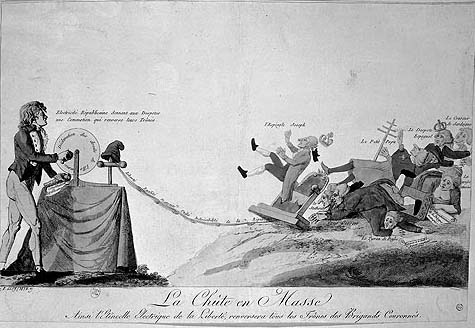What’s Wrong with the Enlightenment?

Both my readers are asked to forgive me today for indulging in a rant, even though it is historically based. I have been wading too long in books by sundry atheists and secularists: Carl Sagan’s The Demon-Haunted World: Science as a Candle in the Dark, Steven Pinker’s Enlightenment Now: The Case for Reason, Science, Humanism, and Progress and Rationality: What It Is, Why It Seems Scarce, Why It Matters.
Such authors are fans of the Enlightenment who often frame the matter as the triumph of Reason over Revelation and claim that it is only when great thinkers began to reject religion was humanity able to accelerate toward a world of science, technological advancement, and an amelioration of society. Faith was a Bad Thing, the product of earlier ages of ignorance. David Hume, the Scottish skeptic, wrote in his 1757 Natural History of Religion:
Examine the religious principles, which have, in fact, prevailed in the world. You will scarcely be persuaded, that they are anything but sick men’s dreams: Or perhaps will regard them more as the playsome, whimsies of monkeys in human shape, than the serious, positive, dogmatical asseverations of a being, who dignifies himself with the name rational.
So much for the Ten Commandments, the Beatitudes, I Corinthians 13, and the simian whimsies that gave us Michelangelo’s Pietà, Mozart’s Requiem and “Amazing Grace”, though Voltaire did admit a certain utility in such fantasies.
I want my lawyer, my tailor, my servants, even my wife to believe in God, because it means that I shall be cheated and robbed and cuckolded less often . . . God is needed to provide a divine sanction for morality. It is absolutely necessary not only for ordinary people, but also for princes and rulers to have an idea of the Supreme Being, Creator, governor, rewarder, and avenger profoundly engraver on their minds …. If God did not exist, it would be necessary to invent him.
The fruit of religion seemed to be intolerance, violence, obscurantism, and sexual repression and the sooner the last king was strangled with the entrails of the last priest, the better off humanity would be. In fact, the material betterment of humanity and profound social reforms that marked the centuries since the Enlightenment cannot be attributed to secularism and an elevation of Reason. The inventors of the steam engine, Newtonian physics, modern chemistry, antiseptic surgery, electromagnetic theory, the computer, genetic variability, and quantum mechanics, were all men of faith. It was Quakers, Anglicans, and Evangelicals who pressed for the abolition of slavery, and Methodists who led the way in penal and factory reform, etc.
But the West, having embraced Enlightenment principles and secularized society, seems not to have produced the utopia that was promised. Reason has justified the invention and use of poison gas, germ warfare, and atomic weapons, and provided excuses for class war, racial extermination, and genocide. What went wrong?
The great error of the Enlightenment was its mistaken anthropology. Hobbes’s view of human nature was abandoned (man is wolf to man), first for Locke (blank slate) and then Rousseau (born free but everywhere in chains). If humans were born good and only ruined by society, then changing society would lead to better humans; perfectibility was a possibility. If only we could get rid of the old ways: kings, popes, private property, the middle class, Jews, kulaks, people who wore glasses, city life, etc. Thus was born every conceivable -ism and their toxic waste products – positivism, Marxism, anarchism, anarcho-syndicalism, fascism, feminism, Marxist-Leninist-Mao Tse Tung Thought, Black Power, Arab Socialism, juche, Trotskyism, liberation theology, racial science, deep ecology, the Terror, Red Guards, the University of Regina, and cats and dogs living together.
The truth lies with Immanuel Kant who said “out of the crooked timber of humanity, no straight thing was ever made.” Humans are born broken and every generation has to be tamed into sociability by law, custom, and family. Attack those and you get what you see today.
I think I’m in love.
Steady on, Bob. Remember what Matt Groening said, “Love is like a snowmobile racing across the tundra and then suddenly it flips over, pinning you underneath. At night, the snow weasels come.”
[…] Gerry Bowler discusses the errors of the Enlightenment. […]